

Web Hypertext Application Technology Working Group. HTMLWorld - HTML, PHP, JavaScript, CSS. Selfhtml.de - HTML lernen und Homepage erstellen. HTML: The Markup Language (an HTML language reference) Abstract This non-normative reference describes the HTML markup language and provides details to help producers of HTML content create documents that conform to the language.
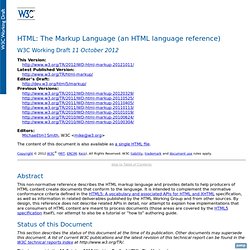
It is intended to complement the normative conformance criteria defined in the HTML5: A vocabulary and associated APIs for HTML and XHTML specification, as well as information in related deliverables published by the HTML Working Group and from other sources. By design, this reference does not describe related APIs in detail, nor attempt to explain how implementations that are consumers of HTML content are meant to process documents (those areas are covered by the HTML5 specification itself), nor attempt to also be a tutorial or “how to” authoring guide. Status of this Document This section describes the status of this document at the time of its publication.
C HTML. In October 2014, the HTML Working Group published HTML5 as W3C Recommendation.
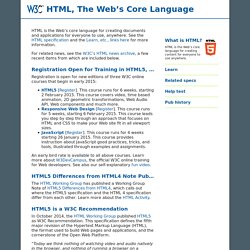
This specification defines the fifth major revision of the Hypertext Markup Language (HTML), the format used to build Web pages and applications, and the cornerstone of the Open Web Platform. “Today we think nothing of watching video and audio natively in the browser, and nothing of running a browser on a phone,” said Tim Berners-Lee, W3C Director. “We expect to be able to share photos, shop, read the news, and look up information anywhere, on any device. Though they remain invisible to most users, HTML5 and the Open Web Platform are driving these growing user expectations.” The HTML5 test suite, which includes over 100,000 tests and continues to grow, is strengthening browser interoperability. With today’s publication of the Recommendation, software implementers benefit from Royalty-Free licensing commitments from over sixty companies under W3C’s Patent Policy. Sonderzeichen, Zeichensätze und Umlaute für Webseiten.
When can I use... Support tables for HTML5, CSS3, etc. HTML. Hypertext Markup Language. Vorlage:Infobox Dateiformat/Wartung/MagischeZahl fehlt Die Hypertext Markup Language (aus dem Engl.; ‚Hypertext-Auszeichnungssprache‘), abgekürzt HTML, ist eine textbasierte Auszeichnungssprache zur Strukturierung von digitalen Inhalten, wie Texten, Bildern und Hyperlinks, in elektronischen Dokumenten.
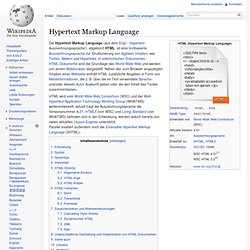
HTML-Dokumente sind die Grundlage des World Wide Web und werden von einem Webbrowser dargestellt. Neben den vom Browser angezeigten Inhalten einer Webseite enthält HTML zusätzliche Angaben in Form von Metainformationen, die z. B. über die im Text verwendete Sprache und/oder dessen Autor Auskunft geben oder die den Inhalt des Textes zusammenfassen.
HTML wird vom World Wide Web Consortium (W3C) und der Web Hypertext Application Technology Working Group (WHATWG) weiterentwickelt; aktuell trägt die Auszeichnungssprache die Versionsnummer 4.01. Entstehung Syntax <p>Ein Textabsatz, der ein <em>betontes</em> Wort enthält. Bestimmte Elemente müssen nicht explizit notiert werden. Sprachtyp Versionen <! SELFHTML 8.1.2 (HTML-Dateien selbst erstellen) Aus SELFHTML-Wiki Wechseln zu: Navigation, Suche Inhaltsverzeichnis Einstieg Wie fange ich an?
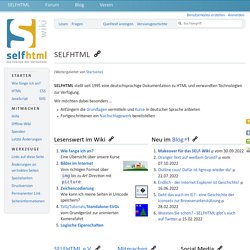
Frage im SELFHTML-Forum stellen‽ HTML/XHTML. Navigationshilfen / Kurzreferenz: HTML. Selfhtml. SELFHTML ist eine Internet-Dokumentation, die sich mit den verschiedenen Aspekten der Erstellung von Webseiten befasst.
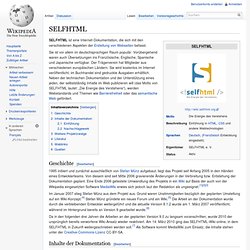
Sie ist vor allem im deutschsprachigen Raum populär. Vorübergehend waren auch Übersetzungen ins Französische, Englische, Spanische und Japanische verfügbar. Der Trägerverein hat Mitglieder aus verschiedenen europäischen Ländern. Sie wird kostenlos im Internet veröffentlicht, im Buchhandel sind gedruckte Ausgaben erhältlich. Neben der technischen Dokumentation und der Unterstützung eines jeden, der selbstständig Inhalte im Web publizieren will (das Motto von SELFHTML lautet: „Die Energie des Verstehens“), werden Webstandards und Themen wie Barrierefreiheit oder das semantische Web gefördert. Geschichte[Bearbeiten] 1995 initiiert und zunächst ausschließlich von Stefan Münz aufgebaut, liegt das Projekt seit Anfang 2005 in den Händen eines Entwicklerteams.
Im Januar 2007 stieg Stefan Münz aus dem Projekt aus. Inhalte der Dokumentation[Bearbeiten] Einführung[Bearbeiten] SELFHTML. Dynamisches HTML. Web & Farben / Web + colors. HTML-Kurzreferenz für Profis. Tutorial - Inhaltsverzeichnis - HTML.net. HTML and CSS.
XHTML. HTML5. CSS. HTML Tips & Help. Gremium. Online Coding Apps. Homepage Building. Web-Editoren. HTTP-Statuscode. Zeichenkodierung.